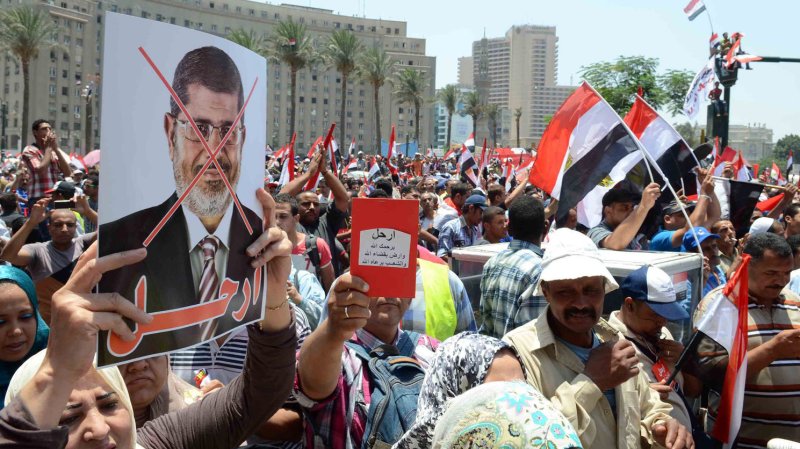1 of 7 | Egyptians protest against President Mohamed Morsi and the Muslim Brotherhood in Egypt's landmark Tahrir square in Cairo. Egypt, on June 30, 2013. Thousands of people rallied in an attempt to oust President Mohamed Morsi. Tensions between Morsi's supporters and his opponents have risen in the lead-up to the anniversary, with at least seven were killed in clashes last week. UPI/Ahmed Jomaa |
License Photo
CAIRO, July 2 (UPI) -- The United States urged Egyptian President Mohammed Morsi to hold early elections and cautioned Egypt's military not to overthrow him, U.S. officials said.
Citing senior Obama administration officials it did not name, CNN reported Tuesday the White House warned a military coup in Cairo could lead to a cutoff of U.S. aid to Egypt.
The officials said the United States told Morsi new elections might "be the only way that this confrontation can be resolved" but did not urge Morsi to resign.
National Security Council spokeswoman Bernadette Meehan said Washington did not urge Morsi to call early elections, but U.S. President Barack Obama "has encouraged President Morsi to take steps to show that he is responsive to the concerns of the Egyptian people and underscored the current crisis can only be resolved through a political process. As the president has made clear since the revolution, only Egyptians can make the decisions that will determine their future."
Obama called Morsi late Monday night, Morsi aides said. They said Obama expressed the White House view that Morsi is Egypt's legitimately elected president and supported the country's transition to civilian democracy.
Morsi Tuesday rejected the army's 48-hour ultimatum to resolve the country's deadly crisis or else the generals would do so.
In a statement, Morsi's office called the army ultimatum a provocation that had not been approved by Morsi's office, and said military action would create disorder.
Hundreds of thousands of protesters renewed calls to oust Morsi from office and the president's Islamists allies vowed to take to the streets to stop what an adviser called "a military coup."
Morsi will consult further "with all national forces to secure the path of democratic change and the protection of the popular will," the presidential statement said.
The military had no immediate response.
A communique from the Supreme Council of the Armed Forces read over state television Monday -- much like announcements more than two years ago that led to the toppling of President Hosni Mubarak -- demanded Morsi satisfy the public's demands within two days, or else the generals would impose their own "road map" out of the crisis.
"We understand it as a military coup," a Morsi adviser told The New York Times. "What form that will take remains to be seen."
Earlier Monday in Tanzania, Obama said he was concerned about the protests but said he saw the situation as different from the protests that prompted Washington to call for Mubarak's ouster in 2011.
"When I took a position that it was time for Egypt to transition, it was based on the fact that Egypt had not had democratic government for decades, if ever," he said.















